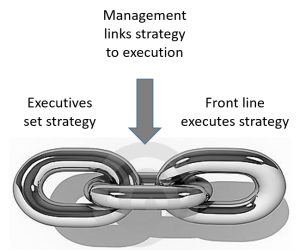The critical link between corporate strategy and front line execution of that strategy is effective management. Without effective management, good ideas remain just that – ideas. It requires managers to translate the ideas to action. Countless books, blogs, videos, and courses tout varying theories and techniques that are designed to make managers more effective by teaching them how to become great leaders. No doubt, great leaders, because of their ability to earn dedication and commitment from those who follow them, can be very effective at getting things done. The problem is that becoming a great leader is difficult, and not everybody can do it. On the other hand, becoming an effective manager is much easier, and most managers can do so by sticking to three fundamental rules:
- Make time to manage. It’s so tempting for managers to get caught up in the deluge of daily responsibilities and put time with their team on a back burner. Managers get pulled from crisis to crisis, and there is always another customer to deal with, project to complete, or email to answer. But failing to dedicate time to managing is an enormous mistake. By doing so, a manager is choosing to focus on the productivity of their own 8 hours in the day instead of the 24, 48, or 60+ hours of employee time in the day. It should be clear that a manager’s leverage over the larger bulk of employee hours is more powerful than the manager’s control over just their own time. Leverage is gained by dedicating time to management behaviors, not just personal contributions.
- Adopt the right management mindset. Managers who view the job of managing as a joyful opportunity to help others succeed are more effective than those who see their job as a necessary evil to make up for the imperfection of employees. Most employees want to do a good job and want to succeed. With a mindset of helping them to achieve that objective, managers keep a positive attitude. When managers view their job as a necessary evil, they are more likely to get frustrated with employees, and that means that coaching and communication will have a more negative tone. Managers with the right mindset see themselves as teachers rather than police officers, and that mindset carries over into communication with the team.
- Execute the management basics. As complex as management seems, there are really only seven core management behaviors (Train, Delegate, Follow Up, Coach, Correct, Praise, and Review). The first key is knowing when to use each behavior. For example, bad things can happen when a manager delegates to an untrained employee. The second key is knowing how to execute each behavior. There are a handful of simple tips that can help every manager execute the seven core behaviors successfully.
Starting today and for the following six weeks, I will post a link to a free training video from a series titled The 7 Core Management Behaviors. Each video is between eight and fourteen minutes long. Together, they provide a basic foundation that will help any manager achieve consistent success. I encourage you to view the videos yourself and to share the links with others inside and outside of your organization who may find benefit. With management serving as such a critical link between strategy and results, you must be sure your front line managers have a solid foundation for the behaviors that will make or break organizational success.
